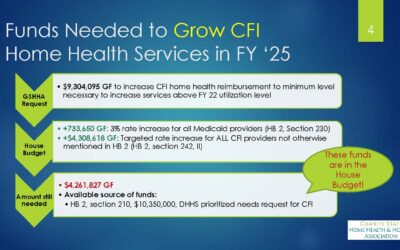
Source: Union Leader – Doug McNut
AFTER Thanksgiving, with families getting together fresh in mind, now is an appropriate time to discuss how our current long-term care system is failing many of us. Too often, older people and adults with physical disabilities cannot access the care they need due to the current system being fragmented, uncoordinated, and underfunded. To ensure that everyone has access to the timely delivery of long-term home and community-based services with a meaningful range of long-term care options, we must improve the existing infrastructure to establish a comprehensive and coordinated care system.
There have been several recent reports identifying problems with the long-term care system for older adults and those with physical disabilities. These include “Barriers to Health Care Transitions in New Hampshire: A Snapshot Review” by the New Hampshire Hospital Association and Foundation for Healthy Communities; the New Hampshire Fiscal Policy Institute’s “Long-Term Services and Supports in New Hampshire: A Review of the State’s Medicaid Funding for Older Adults and Adults with Physical Disabilities”; “Giving Care: A Strategic Plan to Expand and Support New Hampshire’s Health Care Workforce”; and the State Commission on Aging’s annual report.
To achieve the goal of healthy aging, the New Hampshire Alliance for Healthy Aging is proposing a piece of legislation with the goal of creating a more comprehensive, coordinated, cost-effective and better-funded system of long-term care that would enable healthy aging for all in any setting they choose.
This legislation seeks to create a methodology for estimating the Choices for Independence (CFI) waiver service delivery costs to aid in informing decisions regarding reimbursement rates to align future investments with cost changes. The CFI waiver provides services under Medicaid for those who are nursing home eligible and want to stay at home. To best support this program, we recommend that the Department of Health and Human Services budget request for all home and community-based waiver programs for adults to be funded, at a minimum, at the Centers for Medicare and Medicaid Services’ home health agency market basket rate. This position is informed by NHFPI’s report, which shows that funding for CFI services is not matching current inflation rates.
There is no standardized method of identifying the costs for CFI services, which contributes to the underfunding of the CFI program. Implementing an agreed-upon rate methodology would assist in preventing CFI services from falling behind.
The New Hampshire Fiscal Policy Institute’s report interviewed many people who work with the long-term care system regularly. They uniformly felt that the system was too confusing and took too much time for people in crisis and in need of services to remain out of institutions. The Department of Health and Human Services has a median time frame of 45 days to process applications for assistance. Forty-five days is too long.
Families in crisis need and deserve an expedited eligibility process to establish eligibility in a shorter time frame. Other states (Washington and Ohio) do this with a low error rate. In addition, this expedited process would help hospitals, with the Hospital Association report indicating that 26% of individuals experiencing delays in discharge from hospitals were due to the Medicaid application process.
To make the eligibility process more streamlined and understandable for both consumers and providers, there needs to be support in place for navigating the system to track applications. This type of assistance could be provided by the current ServiceLink network, which already plays a role in the application process.
A designated space for consumers to raise concerns and complaints about the application process is also necessary. To do this would require the creation of additional positions in the Office of Long-Term Ombudsman, which focuses on addressing home care issues. Currently, the Ombudsman Office is centered around nursing home and assisted living complaints.
Implementing these recommendations would not only help stabilize the long-term care system but also provide more and better options for people needing long-term care services in New Hampshire.
Doug McNutt is a member of the state Commission on Aging and former advocacy director at AARP. He lives in Concord.


